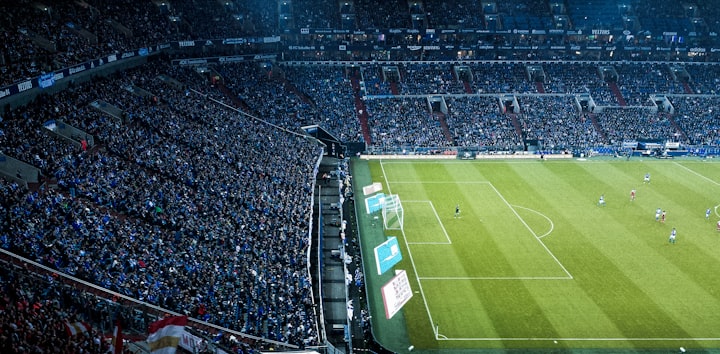Teutonic Decline?
What`s the Matter with German Football?

Hansi Flick, the coach of the German Nationalannschaft, the national football team, just got fired. Rudi Völler, our hero of the 1990 World Cup, took over for a single game and rejuvenated the team. 2:1 against reigning vice-world champion France. Hardly anybody expected that, after all those fails in Russia, Qatar and against ambitious but not yet world-class teams like Colombia and Japan (1:4 last week). Thank God we already qualified for the EURO 2024 as the host nation. What is the issue if a team made up of world stars (ter Stegen), Champion League heroes (Gündogan), and centerpieces of leading teams (Kimmich) underperforms so horribly?
Reform impetus from Venice Beach
In 2004, Rudi Völler was Bundestrainer. He resigned after Germany got eliminated in the EURO way too early. His successor Ribbeck made it even worse, and when the home World Cup 2006 came up, the federation panicked and installed Jürgen Klinsmann (Stuttgart, Bayern, Inter) as Bundestrainer. Klinsmann, living in Los Angeles, was a reformer. But the tactical mastermind behind him was Jogi Löw, the successor of Klinsmann in 2006 and world champion in 2014, with the legendary semifinal against Brazil (7:1). Oliver Bierhoff became team manager (administrative), and Hansi Flick later Löw’s assistant. They all pushed an agenda that did away with the classical German reputation of a fighting team that is always dangerous but far away from the jogo bonito.
Mimicking Spain
Up came Spain, and Löw pushed the Spanish style. Gardiola-like, ball possession, control, academic approach, outside back defenders standing so high up that there was supremacy in the mid-field and the sidelines. And in the end, there was Klose or Podolski as center forward scoring. Those were epic games with Spain in 2008 and 2010, at the height of the “Spanish cycle.” During this period, Germany played a mix of counterplay and ball possession; just check out the matches against England (4:1) and Argentina (4:0) in 2010.

But the tendency was towards ball possession, and when Klose was too old, Germany thought it could do without a center forward, just like the Spanish, where the first man in the line was a 9 ½. In the Bundesliga, foreign players (Lewandowski, Haaland) took the 9, and Germany didn´t care. They put someone there who could maybe play the 9 ½ like Thomas Müller or Kay Havertz, to name a few, but never have been classical center-forwards.
At the same time, the Spanish star was sinking. 75 % ball possession, but hardly any goals, attacking in handball style, circulating the ball round and round until – you lost it. Successful teams such as France or Liverpool combined control with a strong defense. Domination if possible, but counterplay if necessary. And for a while, neither Spain nor Germany found ways and means to deal with it.
The last of the Mohicans
The recognition that you better adapt the system to the players you have and not vice versa was not there in Germany. The German Football Federation (Deutscher Fussball Bund, DFB) postponed reforms until it was too late. We do not have center forwards anymore, we do not have world-class outside backs, and we will have a problem with goalies soon. Sepp Maier, Toni Schumacher, Manuel Neuer, M.A. Ter Stegen – shadows from the past. And the last of the four reform Mohicans, Flick, failed to acknowledge that. He pushed for more and more tactics, ordering his men to the front, way out of the trenches. They got massacred. The backdoor was always open, and on the frontline, nobody scored.
You can't win a match when you don't score (Rudi Völler)
There is no way that you can continue with that without losing the trust of the viewers and the players. In the end, the players were frustrated, paralyzed, and disinterested. Joining the Nationalmannschaft was more a burden than joy. From the perspective of those financing it by watching the matches in the stadium or in TV, it became a form of visual torture.
Football can be so Easy
Völler recognized the problem. Instead of Flick-like experiments (the right-wing outside back becomes midfield anchor when possessing the ball - but then was missing in the defense when the counterplay rolled), he preached and ordered solidity. “The zero has to be maintained (die Null muss stehen),” the former Schalke 04 coach Huub Stevens got it right, asking for defense first. By enforcing defensive structures, such as pushing the first attacking line further back and ordering the mid-fielders into a more defensive position, Völler adapted tactics against France. The result is not surprising: Ball possession against France was at 50:50%. This way, you still may miss to score, but then you end up with a draw, not a loss. That would have been enough in Russia and Qatar. OK, you will have to win some games, especially if you are entering the elimination rounds. No issue, Germany is pretty good at penalty shootouts.
EURO “dahoam”: the Prospects
Germany has strong players. In terms of team value, the Nationalmannschaft is number 7 in the world, but the actual ranking is world`s number 15, a clear discrepancy. Just check out the list of players playing for great teams: Ter Stegen and Gündogan (Barcelona), Rüdiger (Real Madrid), Havertz (Arsenal), Müller, Kimmich, Goretzka, Sané, Gnabry, Musiala (Bayern), Can, Brandt, Süle (Dortmund). But where is our number 9? Average at best. Where are the outside backs that can attack and defend at the same time? And what is the consequence?
In my opinion, there is only one answer to that: Defensive control and counterplay. Bring ambition and reality into liaison. This way, we can go far in the EURO 2024. Remember Rudi Völler, who managed to lead a less talented team into the World Cup final in 2002. I am – now – looking forward to the Euro 2024, even if I am going to miss the German jogo bonito.
About the Creator
Jurgen Dieringer
J Dieringer is a professor of international relations by profession and a musician, writer, and chess player by passion. He strives to merge those inputs and tackle the intersection of arts and science.






Comments
There are no comments for this story
Be the first to respond and start the conversation.